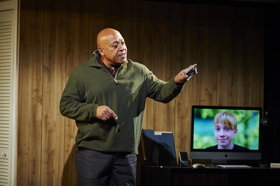Review: THE ABSLUTE BRIGHTNESS OF LEONARD PELKEY Walks a Tightrope at City Theatre

If you're keeping score, it's been eighteen years since the premiere of The Laramie Project, and twenty years since the foundation of The Trevor Project (named for the titular character in James Lecesne's film). Hate crime, homophobia and bigotry are still tense, touchy subjects in American society, the kind that regularly make up tear-jerking "very special episodes" or tragic stage plays. And yet, here we are in 2018, and I can comfortably say that The Absolute Brightness of Leonard Pelkey is a very funny, life-affirming play about a subject people just don't joke about.
Perhaps it helps that the author is no hack- James Lecesne, the actor/writer/activist founder of The Trevor Project- and has approached the subject with both realism and delicacy. Perhaps it also helps that there's a sense of distance from the gritty details: the titular character never appears in the show at all. Whatever it is, the darkness and "man's inhumanity to man" trappings never become so overbearing that the light Michael Shur-esque center of the show becomes bogged down. Kudos to director Laura Savia, who staged the show with a delicate sense of remove- we are not in an evidence locker, examining artifacts from a graphic hate crime, but in a basement rec room, where photos of evidence are displayed on a large, luxurious video screen. To get any closer to the heart of the matter would have tipped the play from tragicomedy directly into tragedy, and perhaps destroyed the central message that goodness and authenticity and "absolute brightness" cannot be stopped by the banality of evil.
As previously mentioned, Leonard Pelkey is not the main character in his own story. Rather, the play revolves around former investigator Chuck DiSantis (Keith Randolph Smith), who took on a missing-person case to locate a flamboyant young teenager, the aforementioned Leonard. This being a mystery, it's hardly a spoiler to say that Leonard quickly turns up dead. But as DiSantis investigates, interviewing friends, teachers, family and distant acquaintances (all of whom are impersonated by DiSantis, and thus played by Smith, during the telling of DiSantis's case), he finds he's doing more than chasing a murderer- he's trailing a ghost. Not the supernatural kind- rather, the unexpected footprints left by a larger-than-life individual, suddenly revealed in his absence.
Lecesne's writing and Smith's performance in these interrogation and interview segments is so strong, it almost tips the play into different waters. As DiSantis explores the fallout of Leonard Pelkey's death, the murder mystery aspect (and, indeed, the whole "crime procedural" framing device) begins to feel secondary. Instead, the characters take center stage: a mob widow who isn't quite as confident in her atheism as she wants to be; a school bully, content in self-justification that social order always manifests itself; a kind-hearted drama teacher desperate to protect himself from predatory rumors; perhaps most of all, an immigrant clockmaker who sees in Leonard the chance to rewrite his own history. Any of these characters could have a motive for lying and murdering Leonard, but for most of the play, I didn't care at all who did it. Leonard's death was never the point here- Leonard's LIFE, and the way even a marginalized outsider can tie a community together, is what truly mattered.
Playing that diverse community is no small feat, and Keith Randolph Smith has his hands full with multiple parts to play. At first, the task seems Sisyphean: Smith is a large, deep-voiced black man with the voice and mannerisms of the crime procedural's "long time on the force, getting too old and too cynical for this shit" stock character. Cleverly enough, the first characters DiSantis embodies are some of the shallowest impersonations: another grizzled cop, a New Jersey hairdresser. When we first see these characters, we don't see THEM; rather, we see DiSantis impersonating them, amusingly but accurately. As the search spreads outward, the characterizations grow more immersive, more realistic, until half an hour in it's no longer just DiSantis impersonating these characters at all.
I'll admit: in today's "woke" media climate, I find myself reluctant to speak too much to the sociological aspects of this show. I've never been a gay teenager, a middle-aged black man, a resident of a poorer New Jersey burb. I've always been an affluent white/off-white straight guy living a middle-class lifestyle. It felt, at times, that I was almost astronomically unprepared to comment on this story and what it could mean to people who are more directly impacted by its themes; this feeling was only accentuated by the play's partnership with queer youth advocacy organization Dreams of Hope. "This play was not made for me, and I accept that," I thought... but a few days later, I'm rethinking that statement. At the risk of sounding insensitive, this play is a lot less about a flamboyant gay kid and a tough black man than it is about literally everyone around them. There are no societal outliers, Lecesne suggests, only points around which everyone and everything else gradually converges. Leonard was only an outsider if you draw the boundaries of your own community to make him so.
Reader Reviews
Videos

